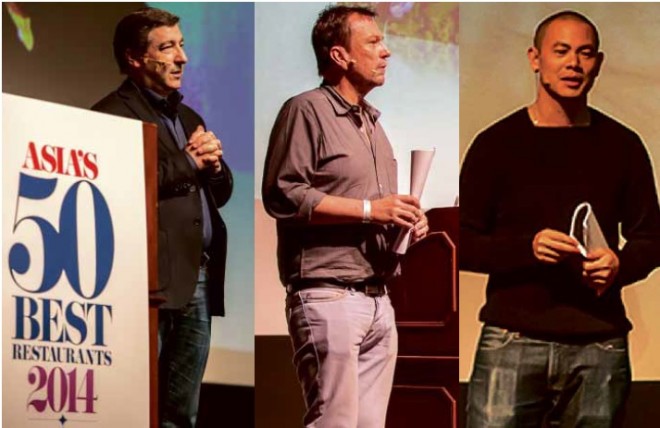Restaurateurs as informal educators in sustainable eating

SPEAKERS at the food forum in Singapore included (left to right) Roca, Thompson and Chiang. WWW.THEWORLDS50BEST.COM
In this new world of celebrity chefs and food shows, Instagram and food blogs, with people the world over continuously posting where they ate and what, restaurants and restaurateurs have acquired unprecedented influence.
In Spain, El Bulli’s Ferran Adria changed the landscape of world cuisine with molecular gastronomy; in Denmark, Noma’s Rene Redzepi took farm-to-table cooking to greater heights; and in London, Jamie Oliver started a global movement for healthier eating, especially in schools.
Recognizing that chefs and restaurateurs today have a social responsibility, organizers of Asia’s 50 Best Restaurant Awards hosted a food forum where the world’s top chefs shared tips on sustainable eating.
Chefs Joan Roca of the reigning No. 1 restaurant in the world, El Celler de Can Roca, and Yoshihiro Narisawa of the 2013 No. 1 restaurant in Asia led the list of speakers who discussed the theme “The Future of Food: Back to our Roots.”
Narisawa, known for serving elegant yet nature-focused food using seasonal ingredients in Japan, said, “Through my cooking, I want to show the importance of nature.” He is known to be a dedicated environmentalist and avid nature lover.
Article continues after this advertisementAt his eponymous restaurant in Tokyo, the first thing to arrive at the table would be a moss-covered stone perfumed like the forest. Diners are surprised to find out it is butter.
Article continues after this advertisement“I am sending a message through my dishes,” he said. “All ingredients have life. Not only animals but also fruits and vegetables. So we have to protect the environment where all living things belong because only human beings have the capacity to protect nature. Our contribution as chefs might be small but we must do our part to have a better earth.”
Narisawa goes to farms and production areas himself. “By visiting production areas, we can realize the things that should be changed,” he explained.
Studying the production of sausages, he learned to replace inorganic phosphate, a chemical generally found in processed sausages, with phosphates from sunflowers, a much healthier alternative.
Buy homegrown
Jack Yoss, director of cuisine at Sheraton Pattaya Resort in Thailand, in his desire to help a small farmer, convinced the Sheraton management to stop importing fruits and vegetables from Europe.
“Guests come to Asia to taste Asian flavors. They don’t come here to taste apples and salmon that they can have at home,” he argued with management. He won the debate and the small farmer started planting baby heirloom tomatoes.
Yoss was motivated by the realization that agriculture was a dying industry. “Some 95 percent of apple varieties available in 1850 are now extinct; 90 percent of heirloom tomato varieties grown in 1940 are now extinct,” he said. “We have to support our farmers.”
The farmer, whom Yoss promised to buy his vegetables from, now grows not only heirloom tomatoes but also haricot, heirloom radicchio, baby heirloom carrots, flowering arugula, gooseberries, rhubarb, Japanese cucumber with flowers, among others. He now supplies 60 different hotels.
Chef Duangporn Songvisava, nicknamed Bo and owner of the celebrated restaurant Bo.Lan in Thailand, said chefs and consumers had the responsibility to care for the environment. “You have a responsibility as well to choose what to put in your mouth,” she said. “While we encourage chefs to use small farmers who produce great products, I want consumers to be aware of this as well.”
During the panel discussion, the role of chefs today as influencers and informal educators was taken up.
David Thompson, whose restaurant Nahm was proclaimed Asia’s Best Restaurant a couple of days later, supported Songvisava’s argument and said, “There needs to be a shift in what people expect. [For example, for your salads] you shouldn’t want leaves that are sprayed to death.”
Support local farmers
The message was that for better food, local farmers should be supported.
Filipinos can do their part.
Restaurateurs should support producers of mountain rice, local coffee, seafoods, such as diwal and apahap, and carabao products, from carabeef to milk.
Some restaurateurs have started doing this, like Margarita Fores of Grace Park and Robbie Goco of Green Pastures. Consumers can help by increasing the demand for locally grown alternatives.